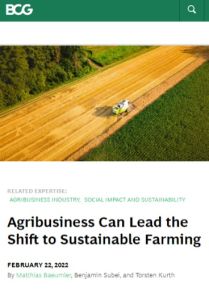Зарегистрируйтесь на getAbstract, чтобы получить доступ к этому краткому изложению.

Зарегистрируйтесь на getAbstract, чтобы получить доступ к этому краткому изложению.
Matthias Baeumler, Benjamin Subei and Torsten Kurth
Agribusiness Can Lead the Shift to Sustainable Farming
Boston Consulting Group, 2022
Что внутри?
Environmental regulations: Are they an inconvenient disruption for agriculture, or a unique opportunity?
Recommendation
To the uninitiated, digital technology and agriculture might seem like incongruous bedmates. One belongs in the big city and trades in zeros, ones and data bits, while the other exists in the silent, windswept fields, and more primal factors, like soil and water and ancient plant DNA are at play. In this report, the Boston Consulting Group explains why digital technology has every right to be out in the fields, and agribusinesses will soon concern themselves primarily with data and tech. Technology will feed the world while agribusinesses will save it from chemical pollutants.
Summary
About the Authors
Matthias Baeumler, Benjamin Subei and Torsten Kurth are professionals from the Hamburg, Düsseldorf and Berlin offices of the Boston Consulting Group.






















Comment on this summary